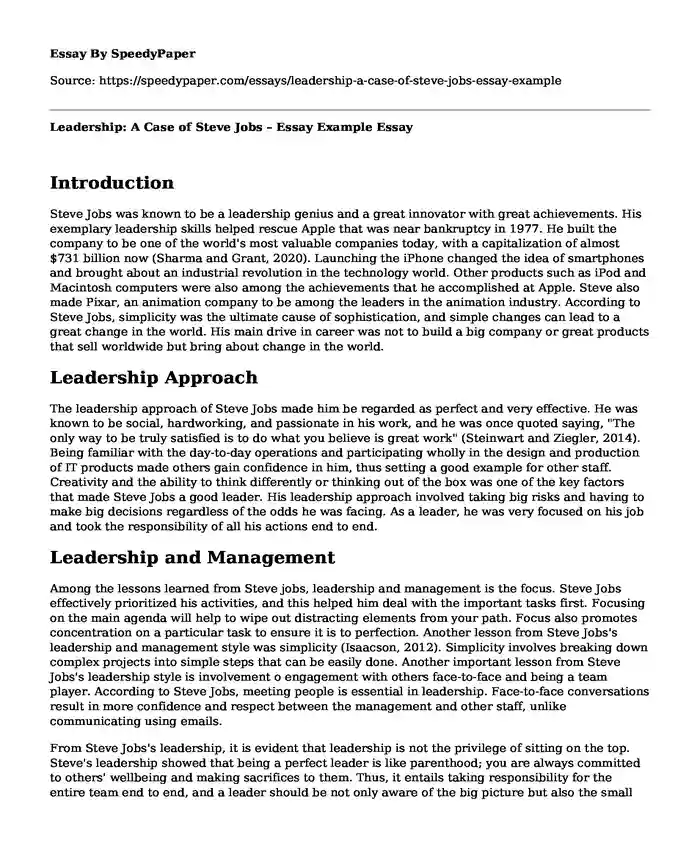
| Type of paper: | Essay |
| Categories: | Company Leadership style Historical & political figures |
| Pages: | 3 |
| Wordcount: | 729 words |
Introduction
Steve Jobs was known to be a leadership genius and a great innovator with great achievements. His exemplary leadership skills helped rescue Apple that was near bankruptcy in 1977. He built the company to be one of the world's most valuable companies today, with a capitalization of almost $731 billion now (Sharma and Grant, 2020). Launching the iPhone changed the idea of smartphones and brought about an industrial revolution in the technology world. Other products such as iPod and Macintosh computers were also among the achievements that he accomplished at Apple. Steve also made Pixar, an animation company to be among the leaders in the animation industry. According to Steve Jobs, simplicity was the ultimate cause of sophistication, and simple changes can lead to a great change in the world. His main drive in career was not to build a big company or great products that sell worldwide but bring about change in the world.
Leadership Approach
The leadership approach of Steve Jobs made him be regarded as perfect and very effective. He was known to be social, hardworking, and passionate in his work, and he was once quoted saying, "The only way to be truly satisfied is to do what you believe is great work" (Steinwart and Ziegler, 2014). Being familiar with the day-to-day operations and participating wholly in the design and production of IT products made others gain confidence in him, thus setting a good example for other staff. Creativity and the ability to think differently or thinking out of the box was one of the key factors that made Steve Jobs a good leader. His leadership approach involved taking big risks and having to make big decisions regardless of the odds he was facing. As a leader, he was very focused on his job and took the responsibility of all his actions end to end.
Leadership and Management
Among the lessons learned from Steve jobs, leadership and management is the focus. Steve Jobs effectively prioritized his activities, and this helped him deal with the important tasks first. Focusing on the main agenda will help to wipe out distracting elements from your path. Focus also promotes concentration on a particular task to ensure it is to perfection. Another lesson from Steve Jobs's leadership and management style was simplicity (Isaacson, 2012). Simplicity involves breaking down complex projects into simple steps that can be easily done. Another important lesson from Steve Jobs's leadership style is involvement o engagement with others face-to-face and being a team player. According to Steve Jobs, meeting people is essential in leadership. Face-to-face conversations result in more confidence and respect between the management and other staff, unlike communicating using emails.
From Steve Jobs's leadership, it is evident that leadership is not the privilege of sitting on the top. Steve's leadership showed that being a perfect leader is like parenthood; you are always committed to others' wellbeing and making sacrifices to them. Thus, it entails taking responsibility for the entire team end to end, and a leader should be not only aware of the big picture but also the small details to attain the big picture (Heracleous and Klaering, 2014). Finally, Steve Jobs's leadership style shows that having the best workmates, staff, and colleagues who understand the leader's dreams and objectives and help achieve the desired objective is key for successful leaders.
Conclusion
From the learned leadership theories, Steve Jobs can be viewed as a transformational leader as he focuses on making sure there is a positive change (Toma and Marinescu, 2013). Steve Jobs is also a very visionary leader who could inspire and lead a team towards real positive change just as it was when he rescues Apple that was near bankruptcy in 1977. Steve Jobs is also a leader who would bend the reality when pushing for perfection, and this made him a pacesetter in setting high standards in the technology industry.
References
Heracleous, L., & Klaering, L. A. (2014). Charismatic leadership and rhetorical competence: An analysis of Steve Jobs's rhetoric. Group & Organization Management, 39(2), 131-161.
Isaacson, W. (2012). The real leadership lessons of Steve Jobs. Harvard business review, 90(4), 92-102.
Toma, S. G., & Marinescu, P. (2013). Steve Jobs and modern leadership. Manager, (17), 260.
Sharma, A., & Grant, D. (2020). Narrative, drama, and charismatic leadership: The case of Apple's Steve Jobs. Leadership, 7(1), 3-26.
Steinwart, M. C., & Ziegler, J. A. (2014). Remembering Apple CEO Steve Jobs as a" Transformational Leader": Implications for Pedagogy. Journal of Leadership Education, 13(2).
Cite this page
Leadership: A Case of Steve Jobs - Essay Example. (2023, Oct 17). Retrieved from https://speedypaper.com/essays/leadership-a-case-of-steve-jobs-essay-example
Request Removal
If you are the original author of this essay and no longer wish to have it published on the SpeedyPaper website, please click below to request its removal:
- The Walmart Effect - Article Review Essay Example
- In-Process Reflection Paper Example: Youth Driving Safety Project
- Amazon and Porter's Diamond Model, Business Essay Example
- Essay Sample on Social Changes Caused By Civil War and Reconstruction
- Essay Sample on To Walk in Dignity: The Montgomery Bus Boycott. Magazine of History
- Paper Example - Amazon Executive Summary and Description
- Market Structure of Amazon - Essay Example
Popular categories




